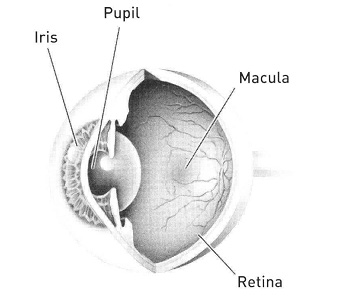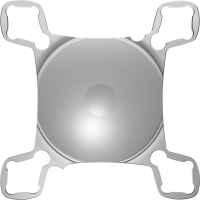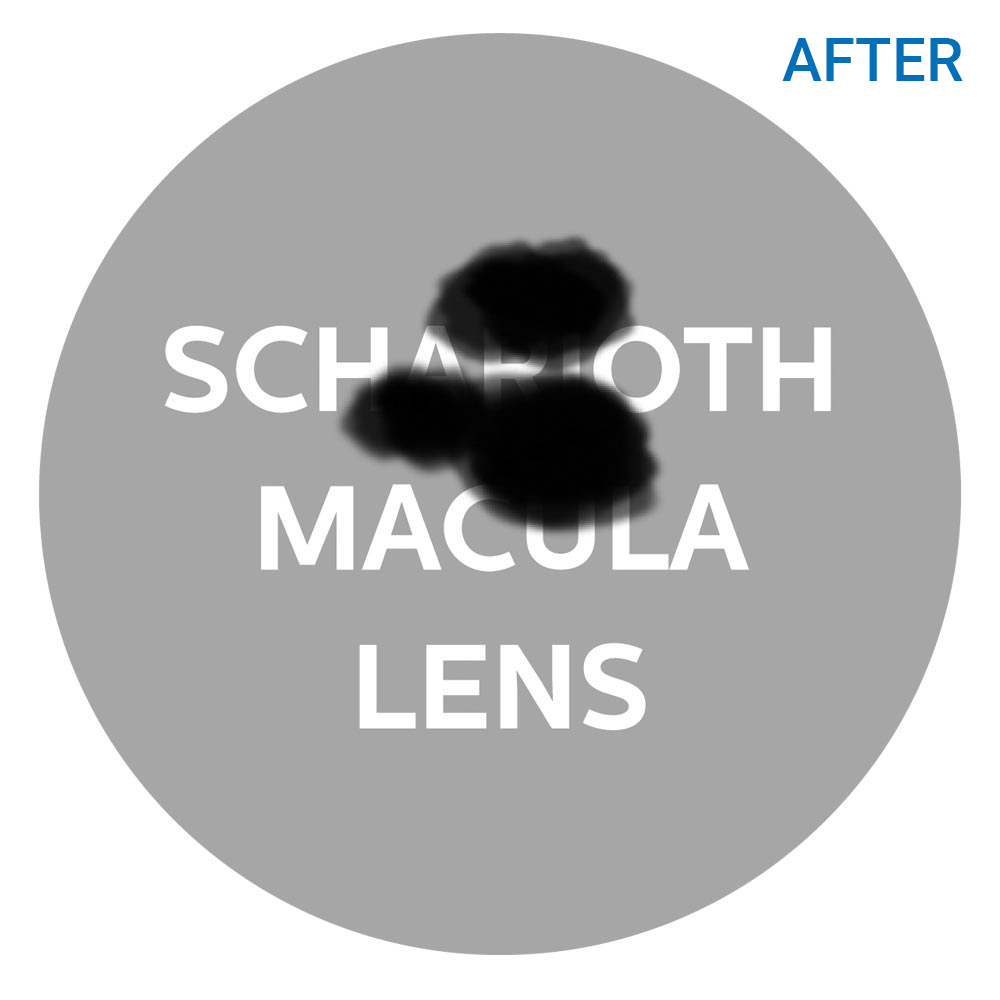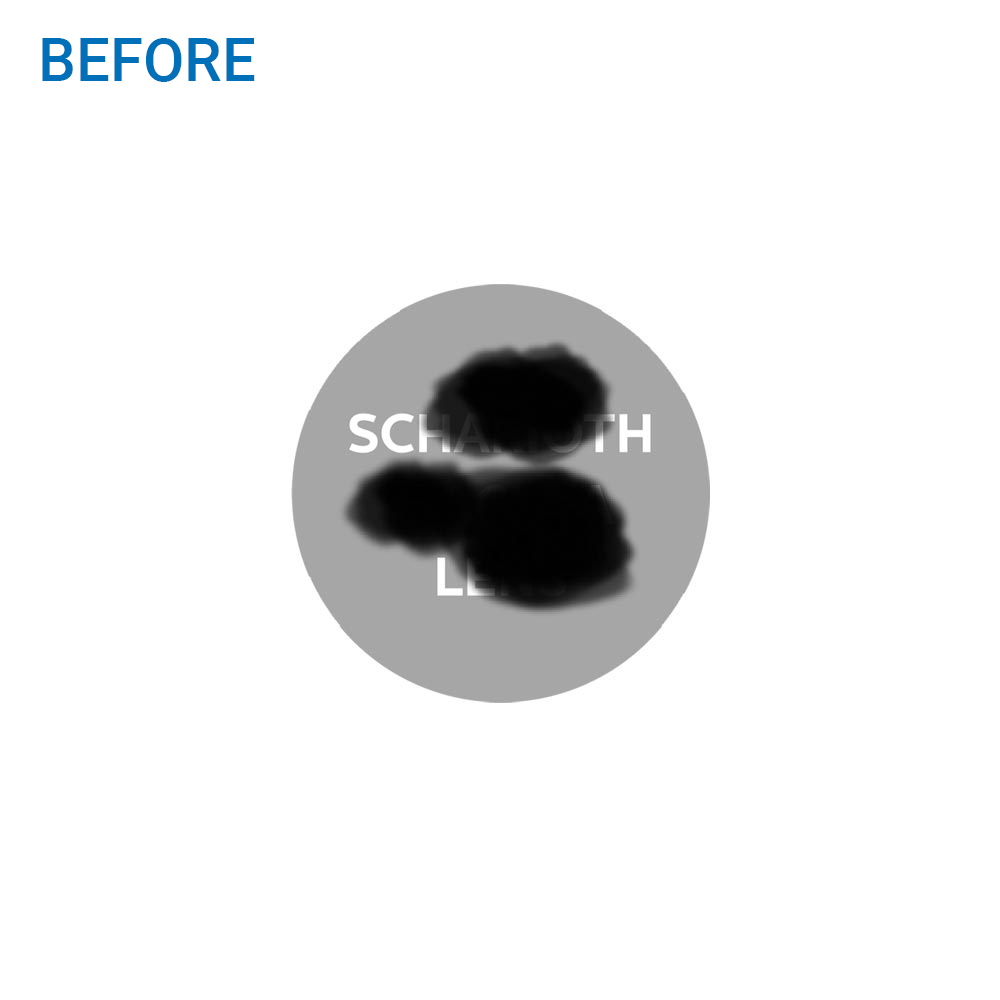The first SML Patient
“My vision was getting worse and worse over the years and I had to obtain so many different low vision aids. Recently, before the surgery I had to rely on a very strong magnifier and a screen reader. It made my life very limited. Today, I can read small print and take a closer look at my delicate woodwork.”
Mr. E. BeckmannThe first patient worldwide to be implanted with the Scharioth Macula Lens

What is AMD?
AGE-RELATED MACULAR DEGENERATION (AMD) IS AN EYE CONDITION THAT OCCURS WHEN CELLS IN THE MACULA DETERIORATE.

The Macula is an area at the back of the eye, few square millimeters wide. It is essential for central vision.
Damage to the macula affects central vision, which is needed for reading, writing, driving, recognizing people’s faces, and doing other fine tasks.
It also affects color perception and contrast sensitivity which are very important, especially in low light conditions.
Currently there is no drug available for DRY AMD and treatment possibilities are limited to low vision rehabilitation devices, or low vision intraocular implants.
For WET AMD there have been significant treatment advances with the introduction of anti-angiogenesis therapy that can prevent blindness and, in many cases, restore the patients vision.
The SML was developed for patients with advanced DRY AMD and can also help with other conditions such as myopic maculopathy, diabetic retinopathy, or hereditary retinal diseases.

How can the SML help Patients with DRY AMD?
THE SML ACTS LIKE A MAGNIFIER IN THE EYE
THE SCHARIOTH MACULA LENS
-
Does not cure your condition, it magnifies.
-
Enables most patients to read again and distinguish small details
-
Does not affect your distance vision
-
Will not influence your regular eye-checkups
The SML works through magnification (approx. 2.2 times)
The dark spots (scotomas) covering the text represent damaged macular areas.
The SML magnifies the text approximately 2 times, but the size of the dark spots remains the same because the SML does not magnify the damaged parts of the macula. Thus, the SML enables patients with dry AMD to read the text.
Move the button to the right to see how the SML works


Why choose SML?
EASY & SAFE SURGERY
REVERSIBLE
AFFORDABLE
NO REDUCTION OF VISUAL FIELD
INDEPENDENT FROM LENS STATUS
DISTANCE VISION NOT AFFECTED

The SML journey
What do I need to know about the surgery?
Sterile
The implantation of the SML is performed under sterile conditions.
High Precision
For high precision the surgery is performed under a microscope.
After surgery
2
Training sessions per day
Patients have to train their eyes regularly.
20
Minutes
The duration of one training session.
4-8
Weeks
You will need to practice performing near vision reading tasks during the first 4-8 weeks after surgery.
15-18
Centimeters
After SML implantation you have to read from a distance of approx. 15-18 cm.
Recovery after surgery is usually very quick and most probably you will experience a significant improvement in your reading ability from the first postoperative day. However you might need a little bit more time to adapt and to train your brain to benefit from your newly implanted SML.
Your doctor will assist you in your rehabilitation, to ‘train your brain’ using the newly implanted SML.
ANY QUESTIONS?
See below the most frequent questions regarding the SML. For further information please contact us.
HOW DOES THE SML DIFFER FROM OTHER LENSES?
-
The SML is the only macular lens that can be implanted through a microincision – a tiny 2.2 mm corneal incision. All other AMD lens implants require a larger incision, which might aff ect post-surgery recovery.
-
Surgery is easy and safe – takes only 15 minutes.
-
Distance vision and the visual field are not impaired after implantation of the SML.
-
The SML is designed for pseudophakic patients – those having an intraocular lens already. Therefore the SML is a secondary lens to be placed in front of a primary intraocular lens. The SML can be implanted simultaneously during cataract surgery, or years later.
I KNOW THAT SUCH LENSES CAN BE EXTREMELY EXPENSIVE. WHAT ABOUT THE SML?
The SML is less expensive than other AMD implants (in some cases 7–10 times less). The SML is affordable!
WILL MY MACULAR DEGENERATION WILL BE CURED AFTER IMPLANTATION OF THE SML?
The SML does not cure AMD. The SML will improve your visual acuity, your ability to read and to see more detail. Remember: After SML implantation you still have to follow the medication & procedures prescribed by your doctor in order to stop or slow down the progession of your AMD. However, the SML will signifi cantly improve your near vision, adding quality to your life.
HOW CAN I KNOW THAT THE SML WILL WORK IN MY CASE?
Talk to your doctor, who has undergone special SML training. They will do the necessary examinations and simulation tests. These tests will show if any improved vision can be reached in your case. After this you can decide whether the SML is the right choice for you.
CAN I DO SOMETHING TO DECREASE THE RISK OF DEVELOPMENT OR STOP THE PROGRESSION OF AMD?
The development of AMD depends on many factors. If you follow the prescriptions and recommendations you might be able to improve or stabilize your AMD condition:
-
moderate your consumption of alcohol
-
eat a healthy diet with at least five portions of fruit and vegetables a day
-
try to achieve or maintain a healthy weight
-
consider taking vitamin and mineral supplements
-
consult your doctor
The recovery after surgery is usually very quick and most probably you will experience a signifi cant improvement in your reading ability from the first day after surgery. Eventually you might need a little bit more time to adapt, and train your brain to benefit from your newly implanted SML.
SHOULD I FOLLOW THE SPECIAL TRAINING INSTRUCTIONS?
Your doctor will assist you in your rehabilitation, to ‘train your brain’ using the newly implanted SML. BUT DO NOT FORGET: After SML implantation you have to read from
a distance of approx. 15 cm!
I AM AFRAID THAT AFTER I HAVE RECIEVED AN SML IMPLANT I WILL NOT BE ELIGIBLE FOR SUCH TREATMENT IF AVAILABLE IN THE FUTURE.
The SML implantation is fully reversible and does not represent any obstacle to any other treatment that might be chosen later.
SML WORLDWIDE

The SML is a joint innovation of Prof. Gábor Scharioth and Medicontur Medical Engineering, a medical device company with 30 years of focused experience with intraocular implants. The first Scharrioth Macula Lens was implanted in 2013 and since then multiple clinics worldwide have included this novel solution into their practice.

